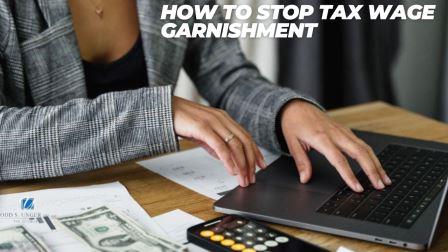Wage garnishment can feel overwhelming, especially when the IRS starts deducting a portion of your paycheck due to unpaid taxes. Understanding how to stop tax wage garnishment is crucial to protect your financial well-being. In this blog, we will explore various strategies to halt wage garnishment, including negotiating with the IRS, appealing decisions, and considering legal and financial solutions. Additionally, we’ll look at a real-life case study, address common concerns through FAQs, and provide tips on how to navigate this challenging situation.
Understanding Tax Wage Garnishment
Tax wage garnishment occurs when the IRS takes legal action to collect unpaid taxes by deducting a portion of your wages directly from your paycheck. This can be a daunting experience, especially since wage garnishment can severely impact your ability to manage everyday expenses. The IRS typically provides several notices before garnishing wages, giving taxpayers the opportunity to resolve their debt.
The Process of Tax Wage Garnishment
- Initial Notice: The IRS sends a notice indicating the amount of unpaid taxes and the deadline for payment.
- Final Notice: If the debt remains unpaid, a final notice is sent, warning of wage garnishment if no action is taken.
- Garnishment: If no response is provided by the final notice deadline, the IRS begins to garnish your wages.
Understanding this process is crucial when exploring how to stop tax wage garnishment.
Six Effective Methods to Stop Wage Garnishment
If you are facing wage garnishment due to unpaid taxes, there are multiple strategies to halt the process:
1. Pay Off Your Tax Debt in Full
The most direct way to stop wage garnishment is to pay off your tax debt. If you can afford to pay the full amount, the IRS will immediately cease wage garnishment once the payment is processed.
2. Set Up a Payment Plan (Installment Agreement)
If you are unable to pay off your debt in one go, consider negotiating a payment plan with the IRS. An installment agreement allows you to make monthly payments toward your tax debt, which will stop garnishment while you adhere to the agreed terms.
3. Offer in Compromise (OIC)
An Offer in Compromise is an option for those who are unable to pay their full tax debt. With this approach, you can negotiate a reduced amount with the IRS. While the offer is being reviewed, wage garnishment is halted.
4. Claim Financial Hardship
If you are experiencing financial hardship and garnishment would leave you unable to meet basic living expenses, you can request a hardship exemption. You will need to provide documentation proving your financial situation, and if accepted, garnishment will stop.
5. File an Appeal with the IRS
If you believe the IRS has made an error in the amount owed or if you want to dispute the garnishment, you can file an appeal. During the appeal process, wage garnishment will be temporarily halted.
6. Change Employment (Temporary Fix)
While changing jobs may temporarily delay wage garnishment, it is not a long-term solution. The IRS will eventually find your new employer and reinstate the garnishment order.
Case Study: John’s Path to Stopping Wage Garnishment
John’s Situation:
John had accrued significant tax debt over several years and began receiving IRS notices about wage garnishment. Unsure of how to handle the situation, he sought professional assistance.
Steps John Took:
- Assessment: John evaluated his financial situation and realized he could not pay off the debt in full.
- Negotiation: He worked with a tax professional to set up an installment agreement, allowing him to make manageable monthly payments.
- Hardship Claim: John also submitted documentation proving financial hardship, which provided temporary relief from additional penalties.
Outcome:
By taking these proactive steps, John was able to stop wage garnishment and gradually repay his tax debt, ultimately regaining control over his finances.
A Summary of Methods to Stop Tax Wage Garnishment
Navigating wage garnishment requires understanding your options and taking prompt action. The six methods outlined above—paying your debt, setting up an installment agreement, negotiating an Offer in Compromise, claiming financial hardship, filing an appeal, or changing jobs—provide different solutions depending on your financial circumstances.
Frequently Asked Questions
Can I stop my tax refund from being garnished?
Yes, by addressing outstanding debts or negotiating with the IRS before they issue a levy against your refund.
How to remove IRS wage garnishment?
To remove IRS wage garnishment, you can pay off your debt, set up a payment plan, or negotiate an Offer in Compromise with the IRS.
How to stop wage garnishment in Georgia?
In Georgia, you can stop wage garnishment by filing a claim of exemption, negotiating directly with creditors, or seeking legal representation.

1 thought on “How to Stop Tax Wage Garnishment: Comprehensive Strategies to Regain Control”